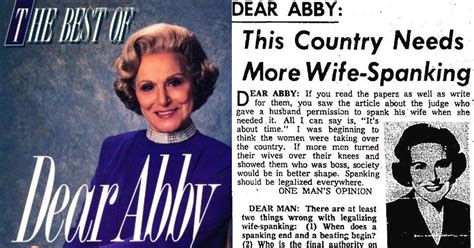
A woman is caught in a distressing love triangle as her boyfriend remains legally married despite his claims of seeking a divorce, prompting her to seek advice from Dear Abby. The concerned woman, identified as “Confused in the Midwest,” detailed her two-year relationship with a man she loves, only to discover he has not finalized his divorce, creating emotional turmoil and uncertainty about their future.
DEAR ABBY: I have been with my boyfriend for two years. I love him dearly. When we met, he told me he was getting a divorce. I recently learned that it hasn’t happened. He says he’s going to take care of it, but I’m now wondering if I should move on. I’m not getting any younger, and I want to be married. I’m so confused. — CONFUSED IN THE MIDWEST
Abigail Van Buren, known as Dear Abby, responded with a firm recommendation: the woman should end the relationship immediately if her boyfriend fails to provide concrete evidence of his divorce proceedings. Van Buren emphasized the importance of seeing tangible proof, such as official court documents, before continuing the relationship. She warned against accepting mere verbal assurances, stating that the boyfriend’s lack of action speaks volumes about his intentions and reliability.
The Dear Abby column addressed a critical issue faced by many individuals in modern relationships: navigating the complexities and potential pitfalls of dating someone who is separated but not yet divorced. The situation presented by “Confused in the Midwest” underscores the emotional strain and uncertainty that can arise when one partner is not fully transparent or forthcoming about their marital status. Van Buren’s advice highlights the necessity of clear communication, verifiable actions, and self-respect in such delicate situations.
The woman’s predicament raises several pertinent questions about trust, commitment, and the importance of legal formalities in relationships. The boyfriend’s initial claim of seeking a divorce, coupled with his subsequent inaction, creates a significant breach of trust. This breach not only affects the woman’s emotional well-being but also casts doubt on the future viability of their relationship.
Diving Deeper into the Situation
The situation described by “Confused in the Midwest” is far from unique. Many individuals find themselves in relationships with partners who are separated but have not yet finalized their divorces. These situations can be emotionally taxing and legally complex, requiring careful navigation to avoid potential pitfalls.
The Emotional Toll
Being in a relationship with someone who is still legally married can take a significant emotional toll. The uncertainty surrounding the partner’s marital status can lead to feelings of insecurity, anxiety, and mistrust. The concerned woman’s confusion is understandable, as she is grappling with conflicting information and the fear of investing further in a relationship that may not have a secure future.
The lack of a finalized divorce can also create a sense of limbo, preventing the woman from fully committing to the relationship or making long-term plans. This emotional stagnation can be particularly difficult for someone who desires marriage and a stable future.
Legal Considerations
From a legal standpoint, dating someone who is still married can have significant implications. While the relationship itself may not be illegal in many jurisdictions, it can complicate issues related to property division, spousal support, and inheritance if the boyfriend’s divorce is not finalized before his death.
Furthermore, if the boyfriend is still legally married, the woman may not have the same legal rights and protections as she would in a traditional marriage. This can be particularly concerning if they were to cohabitate or share assets.
Dear Abby’s Advice: A Closer Look
Dear Abby’s advice to “Confused in the Midwest” is direct and pragmatic: demand proof of the divorce proceedings or end the relationship. This advice reflects a focus on self-respect and the importance of clear boundaries in relationships.
By advising the woman to seek tangible evidence of the divorce, Dear Abby is emphasizing the need for verifiable actions rather than relying solely on verbal assurances. This approach is crucial in situations where trust has been compromised or there is a lack of transparency.
The recommendation to end the relationship if the boyfriend cannot provide proof of his divorce is a strong statement about the woman’s worth and her right to seek a committed and secure relationship. It underscores the idea that she should not settle for less than she deserves and that she has the power to make choices that protect her emotional well-being.
Why Proof is Essential
In situations involving divorce, relying on verbal assurances is rarely sufficient. Individuals may have various reasons for delaying or avoiding the finalization of their divorce, including financial concerns, emotional attachments, or unresolved conflicts with their spouse.
Obtaining official court documents provides concrete evidence that the divorce process is underway and progressing. These documents can include:
- Divorce Petition: This is the initial document filed with the court to initiate the divorce proceedings.
- Summons: This document notifies the other spouse that a divorce petition has been filed and requires them to respond.
- Court Orders: These are orders issued by the court during the divorce process, such as temporary orders for child support or spousal support.
- Settlement Agreement: This is a written agreement between the divorcing parties that outlines the terms of their divorce, including property division, child custody, and spousal support.
- Final Divorce Decree: This is the final order issued by the court that legally dissolves the marriage.
By reviewing these documents, the woman can gain a clear understanding of the status of her boyfriend’s divorce and whether he is genuinely taking steps to finalize it.
The Importance of Self-Respect
Dear Abby’s advice also highlights the importance of self-respect in relationships. The woman’s desire to be married and her concerns about her age are valid and should be respected by her partner. By staying in a relationship where her needs are not being met and where there is a lack of commitment, she risks compromising her own happiness and future.
Ending the relationship may be a difficult decision, but it can ultimately be the most empowering choice for her long-term well-being. It sends a message that she values herself and her desire for a committed relationship and that she is not willing to settle for less than she deserves.
Alternative Scenarios and Considerations
While Dear Abby’s advice is generally sound, there may be alternative scenarios to consider. For example, if the boyfriend can provide a valid explanation for the delay in finalizing the divorce, such as ongoing legal disputes or financial constraints, the woman may choose to give him more time to resolve the issue.
However, it is crucial to establish clear timelines and expectations. The boyfriend should be actively working towards finalizing the divorce and providing regular updates on his progress. The woman should also set a firm deadline for when she expects the divorce to be finalized, and she should be prepared to end the relationship if that deadline is not met.
The Role of Communication
Open and honest communication is essential in any relationship, but it is particularly crucial in situations involving divorce. The woman should have a candid conversation with her boyfriend about her concerns and expectations. She should clearly communicate her desire for marriage and her need for security and commitment.
The boyfriend, in turn, should be transparent about the reasons for the delay in finalizing his divorce and his plans for resolving the issue. He should also be willing to provide proof of his efforts to finalize the divorce and to address any concerns that the woman may have.
Potential Red Flags
Several red flags may indicate that the boyfriend is not being truthful about his divorce or that he is not genuinely committed to the relationship. These include:
- Vagueness: He avoids providing specific details about the divorce process or becomes defensive when asked about it.
- Excuses: He consistently offers excuses for the delay in finalizing the divorce, without taking concrete steps to resolve the issue.
- Secrecy: He keeps his divorce-related documents hidden or refuses to share them with the woman.
- Lack of Communication: He avoids discussing the divorce altogether or becomes withdrawn and distant when the topic is raised.
- Conflicting Information: He provides conflicting information about his marital status or his intentions for the future.
If the woman observes any of these red flags, it is crucial to proceed with caution and to prioritize her own emotional well-being.
Seeking Professional Guidance
In complex situations involving divorce and relationships, seeking professional guidance can be beneficial. A therapist or counselor can help the woman process her emotions, navigate the challenges of the relationship, and make informed decisions about her future.
An attorney can also provide legal advice and guidance regarding the potential implications of dating someone who is still married. They can help the woman understand her rights and protections and can advise her on how to protect her interests.
Conclusion: Prioritizing Honesty and Transparency
The situation faced by “Confused in the Midwest” underscores the importance of honesty, transparency, and self-respect in relationships. Dating someone who is separated but not yet divorced can be emotionally challenging and legally complex. By demanding proof of the divorce proceedings and prioritizing her own well-being, the woman can make informed decisions about her future and ensure that she is in a relationship that meets her needs and expectations. Dear Abby’s advice serves as a reminder that it is crucial to establish clear boundaries, communicate openly, and prioritize self-respect in all relationships, especially those involving complex legal and emotional considerations. The ability to walk away from a situation that compromises one’s values and happiness is a sign of strength and self-awareness, paving the way for healthier and more fulfilling relationships in the future. The issue highlights the broader societal trends of delayed marriages, increased divorce rates, and the complexities of modern dating, where individuals often enter new relationships before fully resolving their previous commitments. These trends create a landscape ripe with potential for misunderstandings, emotional distress, and the need for clear communication and legal safeguards.
Expanding on the Legal Ramifications:
The legal implications for “Confused in the Midwest” extend beyond merely the validity of a future marriage. Depending on the jurisdiction, her relationship could be categorized as adultery, which, while not always criminalized, can impact the divorce proceedings between her boyfriend and his current spouse. This could affect the distribution of assets, spousal support, and even child custody arrangements. Furthermore, should her boyfriend die before his divorce is finalized, she would have no legal claim to his estate unless specifically named in a will, which would likely be contested by his legal wife.
The lack of a finalized divorce also raises questions about the boyfriend’s legal capacity to enter into contracts or make significant financial decisions. Depending on state laws, his assets may still be considered community property, requiring his wife’s consent for certain transactions. This could impact any joint ventures or investments he undertakes with “Confused in the Midwest.”
The Psychological Impact of Ambiguity:
The psychological impact of being in a relationship shrouded in ambiguity can be profound. “Confused in the Midwest” is likely experiencing chronic stress, anxiety, and a diminished sense of self-worth. The constant uncertainty undermines her ability to trust her boyfriend and to feel secure in the relationship. This can lead to emotional exhaustion, depression, and even physical health problems.
Furthermore, the longer she remains in this situation, the more difficult it will be to extricate herself. The sunk cost fallacy – the tendency to continue investing in a failing endeavor because of the resources already committed – can keep her trapped in a relationship that is not serving her best interests. Over time, she may become increasingly isolated from friends and family who disapprove of the relationship, further eroding her support system.
Strategies for “Confused in the Midwest”:
Beyond Dear Abby’s immediate advice, “Confused in the Midwest” should consider several proactive steps:
- Consult with an Attorney: She should seek legal advice to understand her rights and obligations in this situation. An attorney can explain the potential legal ramifications of dating someone who is still married and advise her on how to protect her interests.
- Set Firm Boundaries: She needs to establish clear boundaries with her boyfriend regarding the divorce. This includes setting a firm deadline for when the divorce must be finalized and communicating her willingness to end the relationship if that deadline is not met.
- Seek Therapy: A therapist can provide emotional support and guidance as she navigates this challenging situation. Therapy can help her process her emotions, build her self-esteem, and make healthy decisions about her future.
- Document Everything: She should keep a record of all communication with her boyfriend regarding the divorce, including dates, times, and the content of their conversations. This documentation could be helpful if she needs to take legal action in the future.
- Re-evaluate her priorities: She should consider if what she wants in a relationship is aligned with his actions.
Addressing the Boyfriend’s Potential Motivations:
It is crucial to consider the boyfriend’s potential motivations for delaying the divorce. He may be facing financial difficulties, emotional challenges, or unresolved conflicts with his wife. He may also be hesitant to relinquish control or to confront the reality of ending his marriage.
However, regardless of his reasons, his inaction is causing harm to “Confused in the Midwest.” She deserves to be in a relationship with someone who is honest, committed, and willing to prioritize her needs.
The Broader Societal Context:
The situation highlights the increasing prevalence of complex relationship dynamics in modern society. Factors such as delayed marriages, increased divorce rates, and the ease of online dating have created a landscape where individuals are more likely to encounter partners who are separated but not yet divorced.
This requires individuals to be more proactive in protecting their own interests and in setting clear boundaries in their relationships. It also underscores the importance of open communication, honesty, and transparency in all interactions.
Preventative Measures:
To avoid similar situations in the future, individuals should consider the following preventative measures:
- Thoroughly Vet Potential Partners: Before becoming involved in a relationship, it is essential to gather information about the other person’s background and relationship history. This may involve asking direct questions, conducting online research, and seeking references from mutual acquaintances.
- Be Wary of Red Flags: Pay attention to any red flags that may indicate dishonesty or a lack of commitment. These may include vagueness, secrecy, excuses, and conflicting information.
- Trust Your Intuition: If something feels wrong or off about a relationship, trust your intuition. It is better to err on the side of caution than to ignore warning signs that could lead to heartache.
- Seek Support from Friends and Family: Talk to trusted friends and family members about your relationships. They can provide valuable insights and support, and they may be able to identify red flags that you have overlooked.
The advice given in “Dear Abby” is not only relevant to “Confused in the Midwest”, but also applicable to many people across various demographics and social groups who want guidance on making better decisions in their relationships.
The Importance of Knowing One’s Worth:
Ultimately, the lesson for “Confused in the Midwest” and others in similar situations is to know their worth and to prioritize their own well-being. They deserve to be in relationships with partners who are honest, committed, and willing to invest in their happiness. If a partner is not meeting those needs, it is essential to have the courage and self-respect to walk away and to seek a relationship that is truly fulfilling. The capacity to make difficult choices that protect one’s emotional and mental health is a crucial component of building a happy and successful life. The advice offered highlights the significance of emotional intelligence, clear communication, and self-advocacy in navigating complex interpersonal relationships.
FAQ Section:
1. What should I do if my partner tells me they are getting a divorce but I suspect they haven’t started the process?
- Answer: Dear Abby’s advice is pertinent here: Request concrete proof of divorce proceedings. This could include official court documents such as the initial divorce petition, summons, or any court orders related to the divorce. If your partner is unwilling or unable to provide such documentation, it’s a significant red flag. Openly communicate your concerns and set a clear timeline for when you expect to see progress. If the situation doesn’t improve, consider ending the relationship to protect your own emotional well-being.
2. What are the potential legal risks of dating someone who is still legally married?
- Answer: Dating someone who is still married can present several legal risks. While the relationship itself may not be illegal in all jurisdictions, it could be considered adultery, which can impact the divorce proceedings between your partner and their spouse, potentially affecting asset division, spousal support, or child custody arrangements. Additionally, you may not have the same legal rights and protections as you would in a traditional marriage, particularly regarding inheritance, property ownership, and healthcare decisions. It’s advisable to consult with an attorney to understand your rights and potential liabilities.
3. How can I tell if my partner is genuinely committed to finalizing their divorce?
- Answer: Look for tangible signs of progress. Are they actively engaging with their attorney? Are they attending court hearings or mediation sessions? Are they transparent about the process and willing to share relevant documents? Red flags include vague answers, constant excuses, secrecy, and a lack of communication about the divorce. Trust your intuition and pay attention to any inconsistencies in their behavior or statements.
4. What if my partner claims they are waiting for the “right time” to finalize the divorce due to financial or emotional reasons?
- Answer: While there may be legitimate reasons for delaying a divorce, it’s crucial to assess whether these reasons are valid and whether your partner is actively working towards a resolution. Set a clear timeline for when you expect the divorce to be finalized, and communicate your need for security and commitment. If your partner is unwilling to take concrete steps or continues to delay the process indefinitely, it may be a sign that they are not genuinely committed to ending their marriage.
5. How can I protect myself emotionally while dating someone who is still married?
- Answer: Prioritize your own emotional well-being. Set clear boundaries, communicate your needs and expectations, and seek support from friends, family, or a therapist. Be prepared to walk away from the relationship if it becomes too emotionally taxing or if your partner is not being honest and transparent. Focus on building your self-esteem and maintaining your independence. Remember that you deserve to be in a relationship with someone who is fully available and committed to your happiness.









